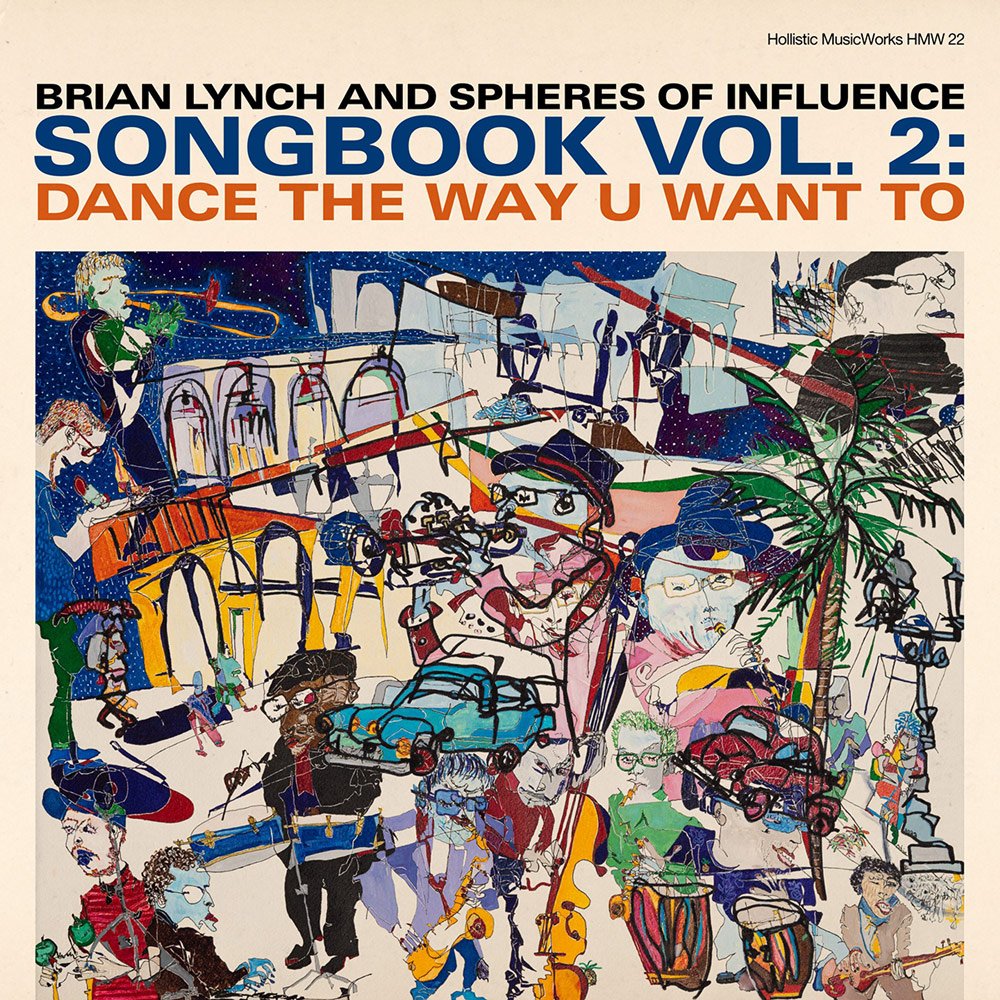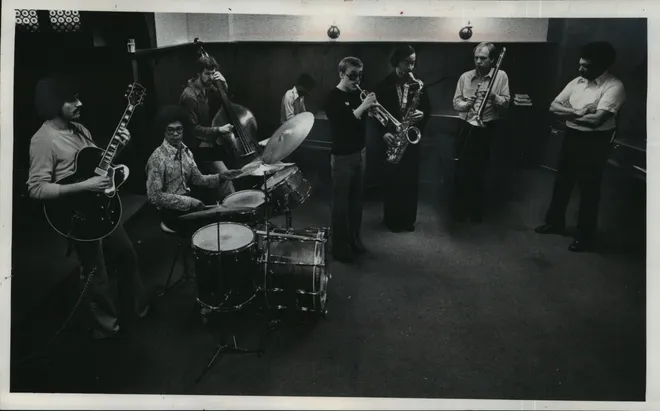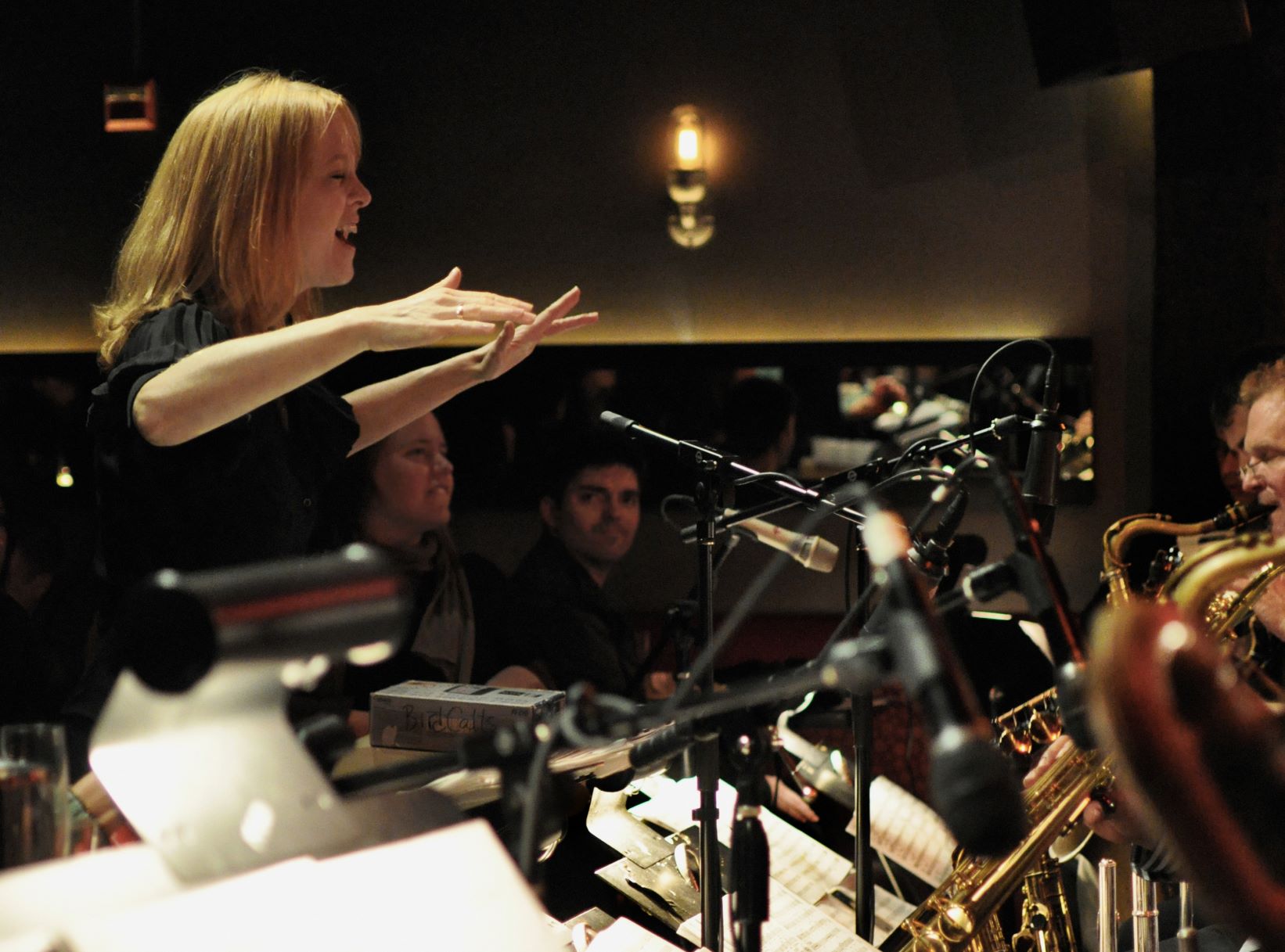



The Brian Lynch Quintet will perform at an album release event for Songbook Volume 2, at Bar Centro, 804 E. Center St., 8:30 p.m. Friday, Aug. 12. Tickets @milwaukeejazzinstitute.org
A Thumbnail Brian Lynch Primer:
Brian Lynch’s trumpet burns, sings and rings the chimes of freedom, within your musical mind, and body.
He is also among the very best — among a steady but small class of musical culture- forgers. Nope, not forger as in faker.
I use forger, the perhaps nakedly exposed subject noun, because Lynch is forging fresh original musical edifices that dance in the wind, as he honors and plumbs the past. He’s mastered the modern jazz canon and advances the vernacular like nobody’s business.
He now supposes to ask: What about my sense of melody, harmony, and composition? He’s proven his ability’s on Songbook Vol 1, and across his storied career. So this is a typically high-grade Lynch release with studio players of any renown, of his choice.
Spoiler alert: Lynch wrote all the tunes on Songbook Vol. 2: Dance the Way U Want To.
Fear not. This is a typically high-grade Lynch release, with chosen studio musicians of any renown, of his choice, all ace purveyors of Cubano-Latin Jazz. 
‘Tis is as much fun as you can have on a Brian Lynch album, even as its musical limbs are plenty meaty enough to step further into the fray of chaos, to make gleaming, spontaneously choreographed, swinging music out of it. He knows how to do that as an composer and arranger, having worked in the highest levels of mainstream jazz, in most of its group forms. (specific review at bottom)
After all he’s a Grammy Award winner for his own big band’s brilliant recording The Omni-American Book Club/ My Journey through Literature in Music. The two-CD session featured Donald Harrison, Regina Carter, Dafnis Prieto, Dave Leibman, and Orlando “Maraca” Valle, and Jim Snidero. Lynch burnishes the modern big band style with literary influences that speak profoundly to the troubles — and defiant potential — of a less-than-humane world, tight-roping their humanity between capitalists and real or neo-authoritarian governments.
His musical ensemble comrises various people he works with often in his Latin American musical travels as a music professor in Florida and through jazz upper circles of influence.
That two-CD aIbum grew from his deep reading of, among other writers, the pioneering African-American sociologist, socialist, historian and civil rights activist W.E.B. DuBois. The album — featuring Donald Harrison, Dave Liebman, Jim Snidero, and Regina Carter, among others — climaxes a series of concept albums involving tributes to “unsung heroes” among trumpeters, a sequence which included his 2016 album commemorating the work of the great, short-lived post-bop trumpet master Woody Shaw, titled Madera Latino. That two-CD set — which also features fellow trumpeters Dave Douglas, Sean Jones and Philip Dizack — was Grammy-nominated for Best Latin Jazz Album. All of the trumpeter-tribute albums and the big-band recording are on Lynch’s own Hollistic Music Works label.
His previous album Brian Lynch Songbook Vol. 1: Bus Stop Serenade, suggested his own street cred, and shows that he long ago found his own voice as a composer, as well as a trumpeter, on previous recordings. Those often involved African-American recording collaborators and mentors like Milwaukee’s Melvin Rhyne and Buddy Montgomery, and saxophonists Harrison, Ralph Moore and Javon Jackson with whom he paired up for the front line of the final edition of Art Blakey and the Jazz Messengers, perhaps the most legendary hard-bop band in jazz history. He also worked with another iconic hard-bop group, The Horace Silver Quintet, a post-bop quintet with Phil Woods, as well as the ground-breaking Toshikio Akiyoshi-Lew Tabackin Jazz Orchestra.
Following are a few photographic lights of fire in Brian Lynch’s long legacy. What follows is my review of Songbook: Vol. 2, to be released Aug. 12.
 In Ralph Peterson and the Messenger Legacy, trumpeter Brian Lynch revisits his front-line fellows, Bobby Watson (left) and Billy Pierce (right), from the final edition of Art Blakey and the Jazz Messengers. Photo courtesy jimmysoncongress.com
In Ralph Peterson and the Messenger Legacy, trumpeter Brian Lynch revisits his front-line fellows, Bobby Watson (left) and Billy Pierce (right), from the final edition of Art Blakey and the Jazz Messengers. Photo courtesy jimmysoncongress.com

Brian Lynch’s educational and performance roots: This award-winning Wisconsin Conservatory of Music student jazz ensemble from the early 1980s, included Brian Brian Lynch on trumpet in the center. From left are guitarist John Zaffiro, drummer Mark Davis, bassist Al Anderson, pianist Marcus Robinson. To Lynch’s left are tenor saxophonist Rolla Armstead and trombonist Hary Kozlowski. Overseeing them is jazz program co-director Manty Ellis, at far right. Courtesy Milwaukee Journal-Sentinel
** ****
REVIEW:
Brian Lynch and Spheres of Influence — Songbook Vol. 2: Dance the Way U Want To (Hollistic MusicWorks)
BY KEVIN LYNCH
Most musicians wouldn’t revisit their own original material, except in concert. But trumpeter Brian Lynch has always probed deeply into many of his artistic forebears, in his “unsung heroes” series and superb Woody Shaw tribute albums, among others. He eventually realized he’d accumulated a deep repertoire of his own originals worthy of reimagining, and owning a label allows this. His self-inquiry remains fruitful on Songbook Vol. 2: Dance the Way U Want To. It’s a way of highlighting his personal “spheres of influence,” which he traces to his early days with Milwaukee’s Latin Jazz band La Chazz. He crafted a style by expanding the bustling crossroads of Latin and modern jazz forms and expression.
Songbook’s subtitle is a key, undercutting any pretense of honorific self-regard, and suggests: “Respond any way you choose.” Some Latin tempos get fast and complex, yet you can “dance” along, literally, or figuratively – “go with it,” by halving the tempo and soaking it up. Yet Lynch invariably takes you by the hand, with his ever-affable lyricism, a rare gift for melody, even in the most heated trumpet improv. A primary “influence sphere” is the great pianist Eddie Palmieri with whom Lynch earned his first Grammy Award on 2006’s Simpatico. The opener “E.P.’s Plan” offers bristling horn harmonies, and Lynch’s solo pushes ideas like a dancer leading a mambo clave with el diablo. By contrast, “Across the Bridge” is a measured theme, seeming to signify a sturdy bridge for Latino and Norte American forms and sensibilities. Pianists Kemuel Roig and Alex Brown especially sustain the tricky Latin rhythms while expanding on sinuous solos, over electric bassist Rodner Padeilla, drummer Hillario Bell and percussionist Murphy Aucamp. 1
Among a wide-ranging wealth of Lynch “dance songs” is a lovely speculative breather, the elegant bolero “Que Seria La Vida” (What Would Life Be Like?). It would be far poorer without the growing Brian Lynch oeuvre.
The Brian Lynch Quintet will perform at an album release event for Songbook Volume 2, at Bar Centro, 804 E. Center St., 8:30 p.m. Friday, Aug. 12. Tickets @milwaukeejazzinstitute.org
____________
This review was first publised in shorter form in The Shepherd Express: Brian Lynch Songbook review

Composer-arranger-bandleader Maria Schneider won two Grammy Awards for her album “Data Lords.” Courtesy the artsdesk.com
All praise Maria Schneider and her larger-than-life, intrepid orchestra! She just won two Grammy Awards for best instrumental composition (“Sputnik”) and best large ensemble recording, for Data Lords. Like a goddess sprouting heavy new wings, Schneider brilliantly ventured far beyond her comfort zone of nature-inspired jazz impressionism, in the Gil Evans tradition: Schneider Grammy announcement
Despite her clear and proud roots, Data Lords affirms her genius as a true original and her prominent place in jazz history. I never actually reviewed this album partly because I’ve given her so much blog and newspaper play over the years and I reviewed in-depth a live concert she performed while unveiling some of Data Lords material, before the album’s release.

Data Lords album cover
I chose Data Lords as my No. 2 album of the year in the NPR jazz critics poll largely because, to me, my top choice, Gregg August’s Dialogues on Race, was too urgently relevant in light of last year’s world-wide racial-justice protests. August’s large ensemble album also carried massive musical weight on its own.
But Schneider’s every statement now virtually demands critical attention, not unlike John Coltrane and Miles Davis, avatars of the post-bop era. Data Lords revealed the fire, indignation and backbone of the music’s leading composer-arranger, fully wielding her past mastery of scoring for jazz orchestra, like a woman warrior leading troops. And, yes, Delacroix’s famous romantic painting “Liberty Leading the People,” comes to mind. And no album had more great music in 2020 than hers. As an artist who records on a self-created label (ArtistShare) and distributes independently, 1 she’s not only a self-made artist but extremely attuned to the role of “data lords,” the gigantic online media companies (Google, Twitter, Facebook, YouTube, etc.) that play a grossly outsize role in how we pursue and receive information on the Internet, and spend our money on cultural products or activity. In other words, Schneider asserts that they virtually lord over our lives because so many of us are now dominated by our involvement in online media.
The Grammy-winning composition “Sputnik” is part of the “protest” side of this two-CD recording, yet it retains the depth of textured and spiritual beauty that trademark her best work, while evoking a profound sense of angst and desolation. By nominally invoking a famous space travel vehicle, it suggests that we may need to travel to new realms far from “home” to regain truth, self-determination, sanity, freedom and societal-coherence – not overseen by the data lords. Here too, an allusion to the Underground Railroad and slavery hovers in the stratosphere. I suggest this not to equate the two, but to honor the cultural pervasiveness of that darkest chapter in this nation’s history.
Such elevated praise might indicate that this is The Maria Schneider Show with musician munchkins. But she chooses her world-class players with Ellingtonian acumen (here, among others, Donny McCaslin, Rich Perry, Steve Wilson, Scott Robinson, Ryan Keberle, Gary Versace, Ben Monder, and the late Frank Kimbrough) and gives them many extended spotlights, which helps expand this to two discs, and there’s hardly a moment of seeming filler.
And Schneider rewards listeners for the facing the sometimes-dissonant challenges of the first CD, “The Digital World,” by reminding us of what she is fighting for, in “Our Natural World,” the gloriously beautiful second disc. Another implication, in these juxtaposed titles, is that data lords’ dominance affects our overall priorities and collective consciousness, perhaps to the detriment of addressing climate change, and the perils to the natural world.
Great art like Schneider’s does its extraordinary work on its own terms, while reaching out to us, to some degree. The cultural covenant is completed when we respond as we will, which that art itself is not responsible for, and yet which reflects its sometimes-uncanny powers of evocation, provocation, and communication.
____________